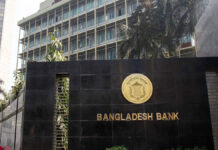
The government is set to make an all-out effort from next month to generate an increased amount of revenue from the legalisation of untaxed money as it needs the sum to kickstart the coronavirus-ravaged economy.
After the upcoming Eid holiday, the National Board of Revenue (NBR) would get down to work to use the money whitening tool to boost earnings for the state coffer.
Under the initiative, the tax administration would run ads in newspapers and televisions, run TV programmes and publish leaflets and brochures to encourage people to bring their untaxed money, popularly known as black money, to the mainstream economy.
The NBR would particularly highlight the opportunities introduced in the current budget that no questions would be asked about the sources of the money disclosed, said an official of the government agency.
Black money is largely attributed to tax evasion and its direct impact is the loss of government revenue.
An addition was made in the last fiscal year — black money holders will not face any questions about the sources of their income if they invest in economic zones and hi-tech parks.
In fiscal 2020-21, the amnesty has been widened as the instrument has so far failed to achieve its objectives of raising revenue for the government and induce investment.
Now, individual taxpayers will be allowed to disclose any type of undisclosed house properties, including land, building, flat and apartment by paying tax at a particular rate on per square metre.
Individual taxpayers will also be able to make any disclosure of undisclosed cash, bank deposits, savings certificates, shares, bonds or any other securities on paying taxes at a rate of 10 per cent.
They can also invest in the capital market and show it in their tax returns. They have to maintain a lock-in period for a year.
No authorities, including the NBR and the Anti-Corruption Commission, would be able to raise any question on such declarations.
In fiscals 2007-08 and 2008-09, Tk 9,682.99 crore was legalised during the regime of the Army-backed caretaker government, which was the highest in the country’s history, NBR data showed.
In the previous two governments of the Awami League, Tk 1,805 crore and Tk 4,856 crore were respectively legalised.
The NBR has made tax return submission mandatory for all tax identification number (TIN) from the current fiscal year to generate revenues in a country that has one of the lowest tax-GDP ratios in the world.
Due to lax in the existing provisions of the law, about 50 per cent of the TIN-holders can now easily afford not to submit tax returns, said Finance Minister AHM Mustafa Kamal in his budget speech on June 11.
Taking undue advantage of the situation, many eligible taxpayers are now avoiding submission of the tax return and evading payment of taxes, he said.
The number of taxpayers in Bangladesh is 20-22 lakh.
To increase the number of taxpayers, the income tax department identified 5 lakh new taxpayers last fiscal year.
Because of the pandemic, revenue collection dropped 2.26 per cent to Tk 218,406 crore in the just-concluded fiscal year against the revised target of Tk 300,500 crore.
This was the first-ever negative growth in Bangladesh’s history.
Bangladesh’s budget deficit may shoot to as high as 10 per cent of the GDP this fiscal year as the government would have to keep spending more to tackle the brunt of the coronavirus pandemic amid a drastic fall in revenue generation, the World Bank said recently.









